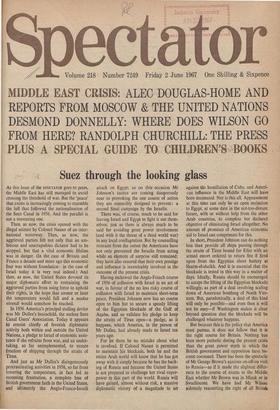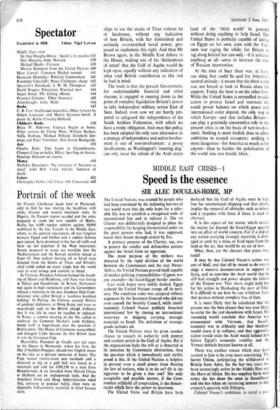Suez through the looking glass
As this issue of the SPECTATOR goes to press, the Middle East has still managed to avoid crossing the threshold of war. But the 'peace' that exists is increasingly coming to resemble the lull that followed the nationalisation of the Suez Canal in 1956. And the parallel is not a reassuring one.
Then, as now, the crisis opened with the illegal seizure by Colonel Nasser of an inter- national waterway. Then, as now, the aggrieved parties felt not only that an am- bitious and unscrupulous dictator had to be stopped, but that a vital economic lifeline was in danger. (In the case of Britain and France a decade and more ago this economic fear was without foundation : in the case of Israel today it is very real indeed.) And then, as now, the United States devoted its major diplomatic effort to restraining the aggrieved parties from using force to uphold their rights, in the hope that sooner or later the temperature would fall and a modus vivendi would somehow be reached.
In 1956 America's principal stalling device was Mr Dulles's brainchild, the useless Suez Canal Users' Association. Today it appears to consist chiefly of feverish diplomatic activity both within and outside the United Nations, a pledge to Israel of economic assis- tance if she refrains from war, and an under- taking, so far unimplemented, to ensure freedom of shipping through the straits of Tiran.
And just as Mr Dulles's disingenuously procrastinating activities in 1956, so far from lowering the temperature, in fact led to mounting frustration, a complete loss of British government faith in the United States, and ultimately the Anglo-Franco-Israeli attack on Egypt; so on this occasion Mr Johnson's tactics are coming dangerously near to provoking the one course of action they are ostensibly designed to prevent: a second Sinai campaign by the Israelis.
There was, of course, much to be said for leaving Israel and Egypt to fight it out them- selves; just as there is always much to be said for avoiding great power involvement (and with it the threat of a third world war) in any local conflagration. But by counselling restraint from the outset the Americans have not only prevented the Israelis from acting while an element of surprise still remained; they have also ensured that their own prestige and influence is inextricably involved in the outcome of the present crisis.
Having eschewed the Anglo-French course of 1956 of collusion with Israel in an act of war, in favour of the no less risky course of collusion with Israel to maintain short-term peace, President Johnson now has no course open to him but to secure a speedy lifting of the Egyptian blockade of the Gulf of Aqaba, and so validate his pledge to keep the straits of Tiran open—a pledge, as it happens, which America, in the person of Mr Dulles, had already made to Israel ten years ago.
For let there be no mistake about what is involved. If Colonel Nasser is permitted to maintain his blockade, both he and the entire Arab world will know that he has got away with it simply because he has the back- ing of Russia and because the United States is not prepared to challenge her rival super- power in this part of the world. Russia will have gained, almost without risk, a massive diplomatic victory of a magnitude to set against the humiliation of Cuba, and Ameri- can influence in the Middle East will have been decimated. Nor is this all. Appeasement at this time can only be an open invitation to Egypt, at some date in the not-too-distant future, with or without help from the other Arab countries, to complete tier declared objective of eliminating Israel altogether. No amount of promises of American economic aid to Israel can compensate for this. ships to use the straits of Tiran without let or hindrance, without any indication of how Britain, with her diminished and seriously overstretched naval power, pro- posed to implement this right. And then Mr Brown again, in the Middle East debate in the House, making one of his 'declarations of intent' that the Gulf of Aqaba would be kept open, equally without any indication of what vital British contribution to this end he had in. mind.
The truth is that the present Government, for understandable financial and other reasons, is engaged in running down to the point of complete liquidation Britain's power to take independent military action East of Suez. Indeed, even now we are barely pre- pared to safeguard the independence of the South Arabian Federation, with which we have a treaty obligation. And once this policy has been adopted the only sane alternative to a strategy of independence and active involve- ment is one of non-involvement : a proxy involvement, as Washington's 'running dog,' can only incur the odium of the Arab states (and of the , `third world' in general) without doing anything to help Israel. The United States is perfectly capable of taking on Egypt on her own, even with the Viet- nam war raging the while; for Britain to tag along behind her can only—if it achieves anything at all—serve to increase the risk of Russian intervention.
At the time of Suez there was, at least, one thing that could be said for America's neutral attitude : it meant that the third world was not forced to took to Russia alone for support. Today the boot is on the other foot. While the United States is compelled to take action to protect Israel and maintain the world power balance on which peace and international order depend, the only way in which Europe—and that includes Britain— can play a genuinely constructive role in the present crisis is on the basis of non-involve- ment. Nothing is more foolish than to allow ambitions to exceed resources: nothing is more dangerous—for America as much as for anyone—than to harden the polarisation of the• world into two hostile blocs.



































 Previous page
Previous page